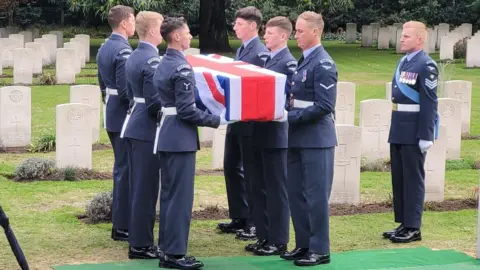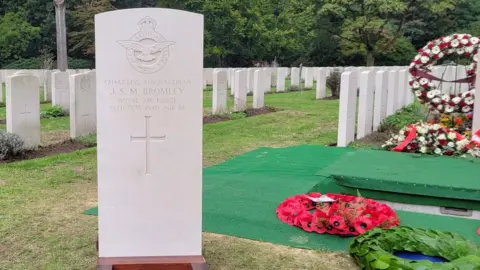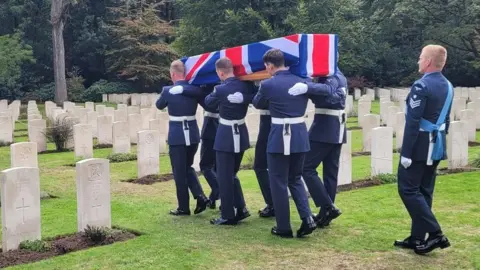WW2 Liverpool airman's remains buried after 82 years
 Ministry of Defence
Ministry of DefenceAn RAF airman who died when his plane was shot down over the Netherlands during World War Two has been buried there, 82 years after his final flight.
Leading Aircraftman John Stuart Mee Bromley, 24, died in the crash in 1940.
His remains were only discovered in 1994 after low water levels at a national park revealed the wreckage.
The unresolved case was closed in 2020 but a group of Dutch people campaigned to reopen it and the case was handed to the British Ministry of Defence (MOD).
Although the site had been initially discovered in 1994 the wreckage had been looted by hobby divers and personal artefacts had been taken.
 Ministry of Defence
Ministry of DefenceA group of locals, many who witnessed the crash during the war as children, spent many years pushing for the case of his identification to be resolved and for the airman to be given a final burial.
In an attempt to identify him the case was reviewed in 2020 by the MOD's Joint Casualty and Compassionate Centre with the Commonwealth War Graves Commission (CWGC) and RAF Air Historical Branch (AHB).
It was finally concluded that the human remains found belonged to Leading Aircraftman (LAC) Bromley.
A member of No 264 Squadron, he was born on 17 March 1916 in Toxteth, Liverpool and was a rear gunner in the single engine, two-seater Boulton Paul Defiant fighter aircraft which crashed on 13 May 1940.
 Ministry of Defence
Ministry of DefenceHis remains were buried at Jonkerbos War Cemetery in Nijmegen, Netherlands on 28 September.
Although his distant relatives were traced by the RAF they were unable to attend, but representatives of the RAF, the British Embassy in The Netherlands and local dignitaries were present.
Rev (Squadron Leader) Josephine Critchley, Chaplain at RAF Honington, who led the service said it may have been over 80 years since Leading Aircraftsman Bromley lost his life "but the time is now right to formally lay his body to rest".
Geert Bekaert from the Commonwealth War Graves Commission (CWGC), said it was "an honour" to be a part the ceremony and added the CWGC will care for his grave at Jonkerbos War Cemetery, along with all those of his comrades "in perpetuity".

Why not follow BBC North West on Facebook, Twitter and Instagram? You can also send story ideas to [email protected]
